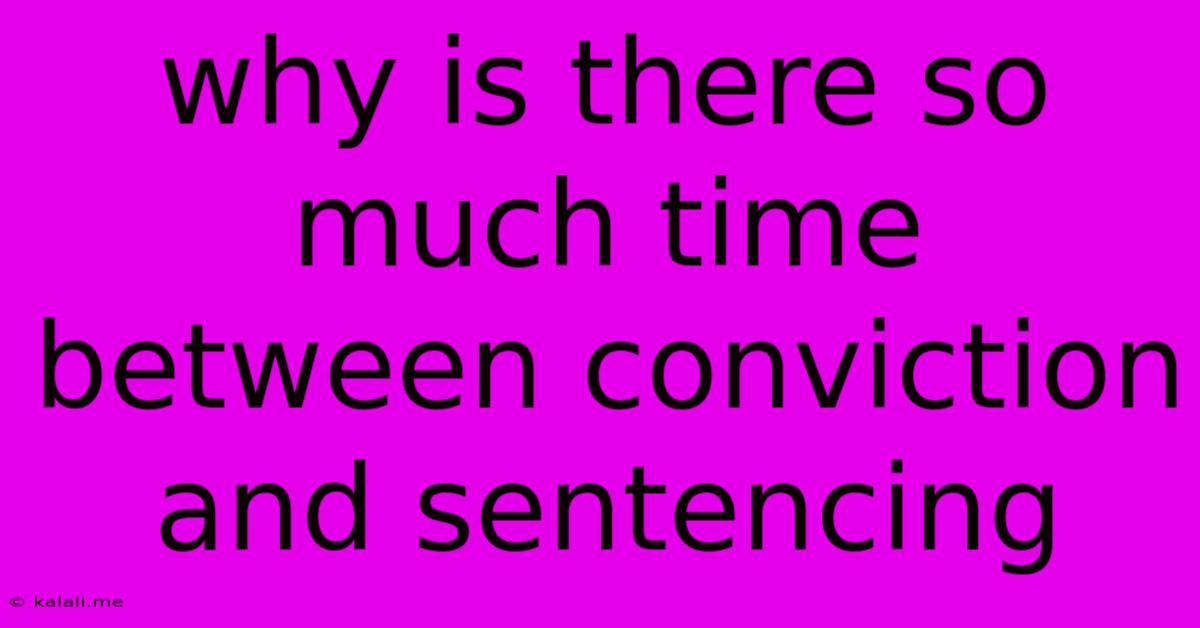Why Is There So Much Time Between Conviction And Sentencing
Kalali
May 30, 2025 · 3 min read

Table of Contents
The Long Wait: Why the Gap Between Conviction and Sentencing?
The courtroom drama often culminates in a dramatic "guilty" verdict. But the story doesn't end there. A significant delay often stretches between a criminal conviction and the actual sentencing. This lengthy period can leave victims frustrated, defendants anxious, and the public wondering why. This article explores the various reasons behind this often considerable time lag.
Understanding the Post-Conviction Process: A Complex Web
The period between conviction and sentencing isn't simply a matter of scheduling. It's a complex process involving numerous legal procedures and considerations, often significantly influenced by the severity of the crime and the defendant's circumstances. Several key factors contribute to the delay:
1. Pre-Sentencing Investigations and Reports: Gathering Crucial Information
Before a judge can impose a sentence, they require a comprehensive understanding of the convicted individual. This involves several crucial steps:
- Presentence Investigation (PSI): This is arguably the most important factor. A probation officer conducts a thorough investigation, interviewing the defendant, their family, victims, and gathering information about their background, criminal history, mental health, and substance abuse issues. This report provides the judge with crucial information to inform their sentencing decision. The detail and complexity of the PSI directly impact the time required.
- Victim Impact Statements: Victims are given the opportunity to share their experiences and the impact the crime has had on their lives. This can be an emotional and time-consuming process, requiring careful consideration and preparation.
- Mental Health Evaluations: If there are questions about the defendant's mental state, the judge may order a psychiatric evaluation. This can take considerable time, depending on the availability of experts and the complexity of the evaluation.
2. Legal Challenges and Appeals: Navigating the Judicial System
The legal process doesn't always end with a conviction. The defendant might choose to file appeals, challenging the legality of the conviction or the procedures followed during the trial. These appeals can significantly delay sentencing, especially in complex or high-profile cases. This process often involves extensive legal briefs, hearings, and potential re-examinations of evidence, pushing back the sentencing date considerably.
3. Scheduling Conflicts and Court Backlogs: The Reality of Overburdened Systems
Court systems, particularly in larger jurisdictions, often face significant backlogs. This means that sentencing hearings, like other legal proceedings, are subject to scheduling conflicts and delays. Judges have limited time and must balance numerous cases, leading to inevitable postponements. The severity of the backlog varies significantly depending on the jurisdiction and the available resources.
4. Plea Bargaining and Sentencing Guidelines: Negotiating Outcomes
Even after a conviction, plea bargains can still influence sentencing. If the defendant agrees to cooperate with authorities or pleads guilty to lesser charges, the sentencing process might involve negotiations between the prosecution and defense, impacting the time until sentencing. Furthermore, adherence to sentencing guidelines (which vary by jurisdiction) necessitates careful consideration to ensure fairness and consistency.
5. Complexity of the Case: Unraveling Intricate Details
The complexity of the crime itself plays a role. Cases involving multiple defendants, extensive evidence, or intricate financial transactions require more time for investigations and legal review, consequently delaying the sentencing process.
Conclusion: Balancing Justice and Efficiency
The delay between conviction and sentencing is a complex issue stemming from the need for thorough investigations, fair legal processes, and consideration of various factors impacting the defendant and victims. While the wait can be frustrating, it highlights the system's commitment to ensuring justice is served accurately and equitably. Improving court efficiency and resources remains a crucial step towards minimizing unnecessary delays and ensuring a smoother, more timely process for all involved.
Latest Posts
Latest Posts
-
What Does Baking Soda Taste Like
May 31, 2025
-
Does Multiplicity Have Anything To Do With Generalized Eigenvectors
May 31, 2025
-
How Do You Eat An Elephant Meme
May 31, 2025
-
Why Is My Ender 3 V2 Printing Sideways
May 31, 2025
-
Whether They Want To Or Not
May 31, 2025
Related Post
Thank you for visiting our website which covers about Why Is There So Much Time Between Conviction And Sentencing . We hope the information provided has been useful to you. Feel free to contact us if you have any questions or need further assistance. See you next time and don't miss to bookmark.